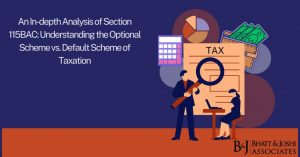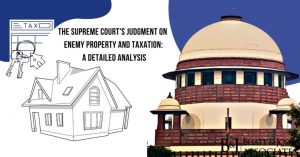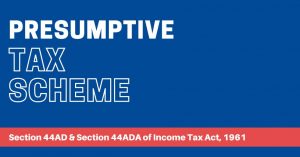Role of Intention for claiming exemption under section 54 of Income tax act
Role of Intention for claiming exemption under section 54 of Income tax act
Introduction
To understand the benefits of Section 54, it is essential to understand the key essentials of the same. A Long term capital asset is that which is held for more than 36 months or 24 months or 12 months, as the case may be, immediately preceding the date of transfer is treated as long-term capital asset. The current applicability of tax under Long term Capital gain on all transactions except on sale of equity shares/ units of equity oriented fund is 20%.
Factual Matrix
I had sold a house on April 4 2019 and had LTCG of 38 lakhs by the sale of this property. I had deposited an amount in the Capital Gains Account of the State Bank of India by following proper documentation. I had purchased a new house and had made a payment of 40lakhs by Demand Drafts part of the payments on 30th March 2019 to the owner. I have an agreement with the owner. The owner has informed me today that he did not encash the DD as yet due to Covid Situation. I have evidence that a DD is prepared but I do not have the receipt.
Available provisions under Income Tax Act?
[Section 54] -Profit on sale of property used for residence
What is the amount of capital gain exemption available under section 54?
The Section 54 of the Income Tax Act allows the lower of the two as exemption amount for a taxpayer:
- Amount of capital gains on transfer of residential property, or
- Investment made for constructing or purchasing a new residential property.
The balance amount (if any) will be taxable as per the income tax act.
Conditions for claiming exemptions under 54.
- Assessee: individual or HuF
- Which asset to transfer: residential house(buildings or lands appurtenant thereto)
- It must be a long-term capital asset
- Income from such house should be chargeable to tax under the head “Income from House Property”
Where during any assessment year, the assessee has exercised the option to purchase or construct two residential houses in India, he shall not be subsequently entitled to exercise the option for the same or any other assessment year.
This implies that if an assessee has availed the option of claiming benefit of section 54 in respect of purchase of two residential houses in Jaipur and Jodhpur, say, in respect of capital gains of rs. 1.50 crores arising from transfer of residential house at Bombay in the P.Y.2020-21 then, he will not be entitled to avail the benefit of section 54 again in respect of purchase of two residential houses in future even though the capital gains arising on transfer of the residential house does not exceed rs. 2 crore.
Amount of Exemption under section 54 will be lower of:
1 long term capital gains arising on transfer of residential house; or
2 amount invested in purchase/construction of new residential house or houses. (including the amount deposited in CGAS before due date of filing of return
If till the date of filing the return of income, the LTCG on such transfer of the house is not utilised (in whole or in part) to purchase or construct another house, then the benefit of exemption can be availed by depositing the unutilised amount into Capital Gains deposit account Scheme (CGAS) with any scheduled bank.
If the amount deposited in the Capital Gains account Scheme in respect of which the assessee has claimed exemption under section 54 is not utilised within the specified period for purchase/construction of the residential house, then the unutilised amount (for which exemption is claimed) will be taxed as income by way of long- term capital gains of the year in which the specified period of 2 years/3 years gets over.
If the new house is also transferred within 3 years from date of acquisition or construction, the cost of the new house would be reduced by the capital gains exempted earlier under section 54.
Case Laws
Various tribunals and courts have taken into account the intention of the assessee to repurchase another residential house as a very essential component for sufficing the essentials of seeking exemption under Section 54 of the Income Tax act.
Where assessee had substantially complied with provisions of section 54(1) by purchasing new house property within prescribed time period, a mere non-compliance of procedural requirement under section 54(2) i.e. some delay in depositing amount in CGAS, could not stand in way of assessee in getting benefit under section 54.
Where assessee had executed an agreement to sell in respect of a house property and purchased a new residential property within one year from date of agreement to sell, even though sale deed could not be executed within time, section 54F relief was to be granted to assessee in respect of purchase of new residential property.
There are cases that allow that even if the new property is not bought in your own name, but in the name of some relatives, then it is allowed to claim the deduction.
If at all we have paid any advance in form of consideration in the light of the agreement to purchase, then the same can be allowed as a claiming the exemption of section 54 of IT Act. “Where advance was paid by assessee to purchase residential flat prior to sale of capital asset, such advance was to be considered as part of purchase for purpose of section 54”
If we say that the encashment was beyond our control, yet we had our intentions to purchase the property, then we can claim it in light of;
“Where assessee sold residential property and entered into an agreement with a builder for purchasing flat for which he invested sale proceeds within prescribed period of two years, merely because assessee got occupancy certificate after 4 years and such delay was beyond control of assessee, assessee’s claim for deduction under section 54 was to be allowed.“
Few more judgements, bringing in liberal interpretation to the term purchase and the strict compliance of conditions.
“In our view, the question whether the above agreement was finally fructified is a different matter altogether. Assessee had in our opinion for all purposes satisfied the conditions u/s 54 of the IT Act, 1961, and earnestly demonstrated his intention to invest the capital gain in a residential house. We are therefore, of the considered opinion, that the assessee ought not have been denied the claim u/s 54 of the IT Act, 1961.”
The court in the case of CIT v. Kuldip allowed a broader view of interpretation.- “It was observed that the word “purchase” used in Section 54 of the Act should be interpreted pragmatically in a practical manner and legalism shall not be allowed to play and create confusion or linguistic distortion. The argument that “purchase” primarily meant acquisition for money paid and not adjustment, was rejected observing that it need not be restricted to conveyance of land for a price consisting wholly or partly of money’s worth. The word “purchase”, it was observed, was of a plural semantic shade and would include buying for a price or equivalent of price by payment of kind or adjustment of old debt or other monetary considerations. It was observed that if you sell a house and make profit, pay Caesar (State) but if you buy a house or build another and thereby satisfy the conditions of Section 54, you are exempt. The purpose was plain; the symmetry was simple; the language was plain.”
Conclusion
Therefore in the light of the above stated case laws, a position can be derived that mere compliance necessities do not allow the taxing officers to withdraw the benefits of exemption provided under Section 54 of Income tax act. The inception of the section was brought in order to help the strive and achieve the goal of home for all and affordable housing facilities. With a liberal interpretation done as in Kuldeep Singh, only the aims and objectives of the legislature can be said to have been achieved. Thus if the assessee truly aims to and wishes without any malafide intention to purchase a single residential house for the purpose of residing, then that should be sufficient to claim the exemption under section 54 of Income tax act.









